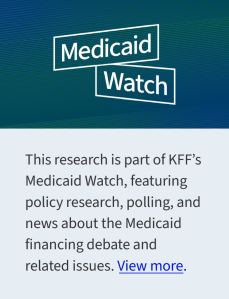 The House recently passed a budget reconciliation bill that includes national Medicaid work requirements for adults in the Affordable Care Act (ACA) expansion group, which the Congressional Budget Office (CBO) estimates would reduce federal Medicaid spending by $344 billion over ten years and increase the number of people without health insurance by 4.8 million. On June 16, the Senate Finance committee released proposed reconciliation language with some substantive changes to the Medicaid work requirement provisions, but this language may change as the Senate debates the bill. Under the House-passed bill, adults enrolled through ACA Medicaid expansion must complete 80 hours of work (or other qualifying activities) per month or meet specific exemption criteria (such as having a substance use disorder (SUD) or “disabling” mental disorder). States must verify compliance (at least) at application, renewal, and every six months thereafter, starting no later than December 31, 2026 or individuals could be denied or disenrolled from coverage. For additional details about this process, see KFF’s explainer.
The House recently passed a budget reconciliation bill that includes national Medicaid work requirements for adults in the Affordable Care Act (ACA) expansion group, which the Congressional Budget Office (CBO) estimates would reduce federal Medicaid spending by $344 billion over ten years and increase the number of people without health insurance by 4.8 million. On June 16, the Senate Finance committee released proposed reconciliation language with some substantive changes to the Medicaid work requirement provisions, but this language may change as the Senate debates the bill. Under the House-passed bill, adults enrolled through ACA Medicaid expansion must complete 80 hours of work (or other qualifying activities) per month or meet specific exemption criteria (such as having a substance use disorder (SUD) or “disabling” mental disorder). States must verify compliance (at least) at application, renewal, and every six months thereafter, starting no later than December 31, 2026 or individuals could be denied or disenrolled from coverage. For additional details about this process, see KFF’s explainer.
Medicaid plays a large part in coverage and treatment of behavioral health conditions, covering nearly one-third of all adults with mental health disorders and one-fifth of all adults with substance use disorders; among Medicaid expansion enrollees specifically, 24% have a diagnosed behavioral health condition. Continuous Medicaid coverage supports ongoing treatment for mental health and substance use disorders, and disruptions may negatively affect individuals’ mental and physical health. Additionally, many adults with mild or moderate conditions already work or engage in qualifying activities but rely on Medicaid-covered medications and treatments to maintain steady employment. This brief describes key challenges that Medicaid work requirements may pose for adults with mental health or substance use disorders.
Medicaid expansion is the primary coverage pathway for people with mental health or substance use disorders. Among Medicaid-covered adults diagnosed with a substance use disorder, 59% qualify through ACA expansion, similar to those with opioid use disorders (61%), any mental health disorder (51%), and serious mental illness (45%, defined here as schizophrenia, other psychotic disorders, and bipolar disorders). These shares are higher when limited to ACA Medicaid expansion states (Figure 1). Others qualify for Medicaid by receiving Supplemental Security Income (SSI) for a disability, as a low-income parent, or pregnant/postpartum individual. Although certain serious mental illness diagnoses may qualify for SSI, the disability determination process is lengthy and complex, and overall two-thirds of Medicaid enrollees with disabilities qualify through non-disability pathways, such as Medicaid expansion. Substance use disorders alone do not qualify individuals for SSI.
The House-passed bill (and language proposed by the Senate Finance Committee) specifies exemptions for individuals with substance use disorders or “disabling” mental disorders from Medicaid work requirements under the “medically frail” designation. Participation in a SUD treatment program is also listed as an exemption in the bill. However, the bill does not explicitly define which diagnoses constitute “disabling” mental disorders. Mental health disorders that substantially impair daily functioning—such as schizophrenia, other disorders involving psychosis, or bipolar disorder—might be among those considered “disabling” mental disorders under the medically frail designation. However, the exact diagnoses qualifying for this exemption have not yet been clarified and will depend on forthcoming federal guidance and state decisions.
Federal and state decisions about implementing work requirements may be particularly impactful for adults with mental health or substance use disorders. However, the extent of the impact may depend heavily on how these requirements are defined and operationalized, and many details currently remain unclear. Upcoming federal guidance may provide some clarification, but processes could still vary by state. For example, the House bill does not specify how states would be expected to identify individuals who are exempt or whether/when individuals may be required to self-report or provide documentation to confirm they meet exemption criteria. Potential challenges include:
- The House bill does not specify states will be required to use available data to automatically verify exemptions, and even states using data may miss some individuals due to data limitations. While states could cross-reference Medicaid enrollment records with other data sources, such as Medicaid claims, to identify exemption-qualifying conditions like substance use disorders or certain mental disorders, there is often a delay of weeks or months between a service being delivered and claims being fully processed. The length of this delay may also differ by state and Medicaid managed care organization, the primary way most enrollees receive care. Claims further delayed due to disputes, denials, or bundling with other services can further obscure specific diagnoses. These data limitations could leave some exempt individuals unidentified, requiring them to initiate and navigate the state’s exemption process. States with outdated or less integrated data systems may face additional challenges, potentially increasing reliance on manual reporting—particularly difficult for individuals with mental health or substance use disorders. For example, when Arkansas implemented Medicaid work requirements, data-matching identified about two thirds of enrollees, exempting them from reporting work hours or exemption status. Among those who had to actively report, about 70% did not obtain an exemption or report compliance with the work requirements, ultimately resulting in over 18,000 people losing coverage. Arkansas is among a subset of states that already makes “medically frail” determinations because they opt to provide an “alternative benefit package” to ACA expansion adults, enrolling them in Marketplace health plans (while individuals designated “medically frail” may receive the “traditional” Medicaid benefit package). As a result, the state may be better positioned to conduct data matching for exemptions relative to other states; but still Arkansas highlighted (in its new waiver request) that limitations with “data matching” led to some individuals with medical conditions or disabilities that prevented them from working to “fall through the cracks” when the state implemented its work policies in 2018.
Common behavioral health symptoms would make it more challenging for individuals with these conditions to self-report work or exemption status. Behavioral health symptoms can include challenges with concentration, planning, energy levels, anxiety, feelings of overwhelm, and difficulties managing stress, all of which may make it harder for enrollees to understand requirements, navigate complex submission processes, and troubleshoot issues that arise. Individuals experiencing severe or acute behavioral health symptoms may find it particularly difficult to provide documentation, especially for those whose disorders are compounded by unstable employment, housing instability, or homelessness—which is more common among those with serious mental health disorders or severe substance use disorders. Therefore, mental health and substance use disorders themselves could increase the risk of Medicaid coverage loss under proposed requirements. Provider burden may increase if provider documentation is required to obtain an exemption. Under New Hampshire’s work requirement waiver, adults who self-attested to being medically frail were still required to obtain certification from a medical professional of their medical frailty exemption, which was reportedly difficult for enrollees to navigate and complicated for providers.
Hypothetical Scenario 1: Managing Exemption Paperwork While Experiencing a “Disabling” Mental Disorder
Ray, age 23, was diagnosed with bipolar disorder two years ago. He experiences severe episodes of mania and depression. Although medication helps, it does not eliminate symptoms, and Ray doesn’t always take his medications consistently. Maintaining steady employment is often challenging, and Ray is awaiting a determination hearing for his SSI application.
In the Medicaid expansion state where Ray lives, bipolar disorder qualifies as a “disabling” mental disorder, exempting him from Medicaid work requirements. However, the state is unable to automatically verify / data match the exemption, requiring Ray to submit documentation to confirm he is exempt from the requirements.
Last month, Ray received a Medicaid renewal notice reminding him to submit his exemption documentation by May 1st but difficulty filling his prescription led to a medication gap and resulted in a severe depressive episode. During these episodes, Ray struggles with energy, motivation, clarity of thought, and focus, making daily tasks—including submitting paperwork—overwhelming.
Ray did not submit the required documentation by the deadline and Medicaid followed up with a notice of noncompliance a week later, giving him 30 additional days to respond. However, Ray’s mental health hadn’t improved, and he did not follow up. Shortly after, he went to the emergency room due to persistent suicidal thoughts. At the ER, Ray discovered he had been disenrolled from Medicaid. The ER provided short-term stabilization care and a prescription for medication. He could not afford to fill the medications prescribed by ER doctors.
Ray can reapply for Medicaid and request a new exemption by submitting documentation from a mental health provider. However, without Medicaid, he has struggled to find a provider to document his condition, complicating his ability to regain coverage.
- Mild and moderate mental health disorders may not qualify adults for exemptions from work requirements; however, symptoms could lead to employment gaps, making compliance with new requirements more difficult. People with mild or moderate disorders can experience episodic symptoms, such as depressive episodes or severe anxiety, which can disrupt consistent employment. The House bill allows states to provide short-term hardship exceptions, such as during inpatient psychiatric stays; however, these exceptions are not federally required and must be requested by the enrollee. Additionally, variation in work requirement implementation could further affect compliance. For instance, states that require verification of work history over three consecutive preceding months may present greater compliance challenges compared to states with less stringent criteria.
Hypothetical Scenario 2: Missing Work Due to a Moderate Mental Health Disorder
John has a depressive disorder where he intermittently experiences severe episodes. When his depressive episodes occur, daily tasks become difficult. His medication generally helps manage his depression and maintain employment. His condition is not classified as “disabling,” so he must meet Medicaid work requirements (at least 80 hours per month) to maintain coverage in the expansion state where he lives.
John’s state verifies every six months that he worked at least 80 hours each month, and chooses to “look-back” the two preceding months when verifying compliance at application and renewal. In May, John experienced a depressive episode that left him unable to meet the 80 hours of work. Following adjustments to his mental health medications and with therapy, he returned to work later the same month, but still fell short of the required 80 hours for that month.
On July 1st, when John’s Medicaid renewal and verification of work compliance were due, he was deemed noncompliant because he was unable to meet the 80 hours of work requirements in May. John received a noncompliance notice from the state, and 30 days later, lost Medicaid coverage and access to mental health care. Without coverage or alternative payment options, John is unable to access his medication and treatment services, resulting in a worsening of his mental health condition.
He can reapply for Medicaid after he meets the state’s 80-hour monthly work requirements for two consecutive months.
- Individuals with new or undiagnosed behavioral health disorders may struggle to qualify or maintain Medicaid coverage without sufficient work history or formal diagnoses. Adults experiencing sudden symptoms, such as a first episode of psychosis, may face significant difficulties navigating exemption processes quickly, particularly at the onset of a disorder, which can be confusing and difficult in itself. Additionally, many adults have undiagnosed behavioral health disorders, an issue especially common among people with substance use disorders. If enrollees are required to submit an official diagnosis to receive an exemption, individuals without an official diagnosis remain subject to work and reporting requirements, potentially leading to coverage loss if symptoms disrupt employment. Even in states that use Medicaid claims data to identify exemptions, there is typically processing time between service dates and when the visit appears in claims data, which can delay states’ identification of individuals with new diagnoses. In addition, applicants with recent employment gaps due to mental health or substance use symptoms may face additional barriers documenting compliance or exemption status at enrollment. For example, Georgia—the only state currently requiring work compliance at Medicaid application—experienced significantly lower enrollment than anticipated due to these requirements, though it did not allow any exemptions.
Being in poor health is associated with an increased risk of job loss, while access to affordable health supports obtaining and maintaining employment. Regular access to care, including mental health and substance use disorder treatment, can help stabilize behavioral health symptoms. However, disruptions or losses in coverage can interrupt treatment, exacerbating these conditions. For instance, stopping medication for opioid use disorder significantly increases mortality risk, with individuals facing a six-fold greater risk of death in the four weeks immediately following treatment discontinuation.









 English (US) ·
English (US) ·